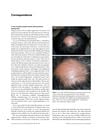 12 citations,
June 2019 in “Actas dermo-sifiliográficas/Actas dermo-sifiliográficas”
12 citations,
June 2019 in “Actas dermo-sifiliográficas/Actas dermo-sifiliográficas” Proper skin toxicity management in chemotherapy is key to continuing treatment and keeping patient quality of life high.
 11 citations,
February 2020 in “Dermatology and therapy”
11 citations,
February 2020 in “Dermatology and therapy” Low-Level Light Therapy significantly reduced inflammation and promoted hair regrowth in patients with Lichen planopilaris.
 11 citations,
August 2009 in “Dermatologic Surgery”
11 citations,
August 2009 in “Dermatologic Surgery” A man developed a rare scalp disorder, Folliculitis Decalvans, 20 years after hair restoration surgery, and it required long-term antibiotic treatment.
 11 citations,
July 2008 in “International Journal of Dermatology”
11 citations,
July 2008 in “International Journal of Dermatology” Greying hairs may be protected from alopecia areata.
 11 citations,
January 1993 in “Dermatology”
11 citations,
January 1993 in “Dermatology” EMS and EF both show similar skin and fascia changes, but EMS has more severe symptoms and nerve inflammation.
 11 citations,
December 1921 in “Archives of dermatology and syphilology”
11 citations,
December 1921 in “Archives of dermatology and syphilology” A rare scalp disease causes hair loss, pus-filled nodules, and scarring.
 10 citations,
June 2019 in “Case reports in dermatology”
10 citations,
June 2019 in “Case reports in dermatology” LALPS causes non-scarring hair loss along the Blaschko line, with unique trichoscopic findings.
 10 citations,
May 2009 in “Cases Journal”
10 citations,
May 2009 in “Cases Journal” A woman's masculine symptoms were caused by an ovarian tumor, which improved after surgery.
 10 citations,
July 2008 in “Journal of Cutaneous Pathology”
10 citations,
July 2008 in “Journal of Cutaneous Pathology” Increased mucin in the skin might indicate lupus in patients with hair loss, but more research is needed.
 9 citations,
July 2020 in “Journal of Dermatology”
9 citations,
July 2020 in “Journal of Dermatology” Asian patients with Frontal Fibrosing Alopecia often lose eyebrow hair and respond well to combined antiandrogen or antimalarial and topical treatments.
 9 citations,
March 2017 in “JAAD Case Reports”
9 citations,
March 2017 in “JAAD Case Reports” A woman's scalp condition improved with specific ointment after a hair piece caused skin issues.
 9 citations,
August 2014 in “The Journal of Dermatology”
9 citations,
August 2014 in “The Journal of Dermatology” Scalp areas that look normal in people with hair loss may still show signs of disease under a microscope.
 9 citations,
June 2014 in “British Journal of Dermatology”
9 citations,
June 2014 in “British Journal of Dermatology” The study found that balding scalps have more thin hairs and larger oil glands, which might contribute to skin conditions related to hair loss.
 7 citations,
June 2019 in “Cureus”
7 citations,
June 2019 in “Cureus” Fractional lasers and microneedling, combined with topical agents, could potentially treat Alopecia Areata effectively, but more research is needed due to limited data.
 7 citations,
August 2018 in “South African Medical Journal”
7 citations,
August 2018 in “South African Medical Journal” Clinicians should understand tattoos to manage health issues, as tattoos can cause complications and affect medical assessments.
 7 citations,
March 2018 in “Journal of The American Academy of Dermatology”
7 citations,
March 2018 in “Journal of The American Academy of Dermatology” Skin changes like hair loss, white patches, and nail changes are common in children after bone marrow transplants, often linked to chronic rejection.
 7 citations,
December 2016 in “British Journal of Dermatology”
7 citations,
December 2016 in “British Journal of Dermatology” The report suggests that hair loss in Cronkhite-Canada syndrome may be caused by alopecia areata incognita, as shown by a patient's improvement with treatment.
 7 citations,
April 2011 in “Expert review of dermatology”
7 citations,
April 2011 in “Expert review of dermatology” The document concludes that patients with skin of color need specialized dermatological care and education to manage unique skin conditions effectively.
 7 citations,
July 1990 in “Journal of the American Academy of Dermatology”
7 citations,
July 1990 in “Journal of the American Academy of Dermatology” A woman with bullous pemphigoid had an allergic reaction to azathioprine, but got better with alternative treatments.
 6 citations,
May 2020 in “Pharmacology Research & Perspectives”
6 citations,
May 2020 in “Pharmacology Research & Perspectives” A new gel form of minoxidil is equally effective for hair growth and safer for the heart and other organs than the traditional solution.
 6 citations,
May 2020 in “JAMA Ophthalmology”
6 citations,
May 2020 in “JAMA Ophthalmology” Using 5-alpha-reductase inhibitors, drugs for prostate issues and hair loss, may lead to eye abnormalities in men.
 6 citations,
April 2019 in “Journal of Cosmetic Dermatology”
6 citations,
April 2019 in “Journal of Cosmetic Dermatology” Hair loss affects women's self-esteem; treatments like minoxidil can help.
 6 citations,
January 2019 in “Dermatology Research and Practice”
6 citations,
January 2019 in “Dermatology Research and Practice” Many survivors of Stevens-Johnson Syndrome and Toxic Epidermal Necrolysis in Togo suffer long-term eye and skin problems.
 6 citations,
December 2016 in “Springer eBooks”
6 citations,
December 2016 in “Springer eBooks” Environmental stressors like UV radiation, pollution, and extreme temperatures can damage skin and lead to diseases and aging.
 6 citations,
February 2014 in “Human & experimental toxicology”
6 citations,
February 2014 in “Human & experimental toxicology” Testosterone injections can cause skin darkening and thickening.
 6 citations,
October 2013 in “Expert Review of Dermatology”
6 citations,
October 2013 in “Expert Review of Dermatology” Psychotropic medications can cause skin problems, including serious conditions, and patients should be monitored closely.
 6 citations,
April 2013 in “Current Dermatology Reports”
6 citations,
April 2013 in “Current Dermatology Reports” Dermatologists are crucial for managing skin side effects in metastatic melanoma patients using vemurafenib and ipilimumab.
 6 citations,
February 2013 in “Medical Oncology”
6 citations,
February 2013 in “Medical Oncology” Certain genetic variants increase the risk of resistance to hormone therapy in prostate cancer patients.
 6 citations,
May 1993 in “Archives of Disease in Childhood”
6 citations,
May 1993 in “Archives of Disease in Childhood” Children's hair loss can be caused by many factors, including autoimmune diseases, emotional stress, genetics, and infections, with treatment and prognosis varying.
 5 citations,
February 2019 in “Oral and Maxillofacial Surgery”
5 citations,
February 2019 in “Oral and Maxillofacial Surgery” Hair loss can be reversed or even cured using advanced hair restoration techniques, with rare complications like swelling and bleeding.





























